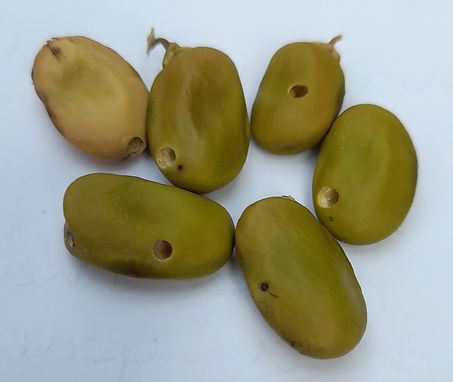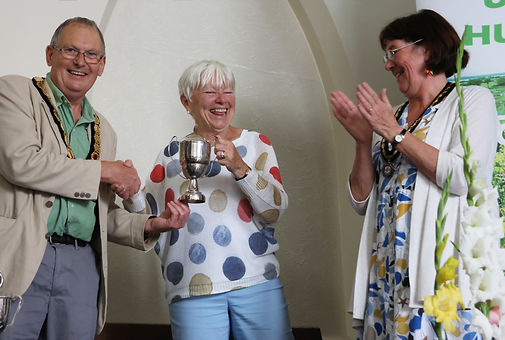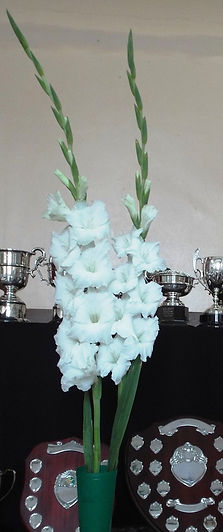Community Links
The Bartonian
A team of volunteers write and produce the Bartonian, in collaboration with Barton Town Council, who
have the final editorial approval for each edition. A separate team of 40 volunteers ensure it is delivered
to every house in the town.
This free magazine provides up to the minute information on all local events and happenings as well as
detailed articles outlining the history of our town. Not only does it keep residents informed on every
local aspect, but it also provides an insight into our small North Lincolnshire town, little known to the
rest of the world.
We are very lucky to have this level of community involvement, especially as the Barton Allotment
Society has its own designated slot within each edition written by our Secretary, Neil Jacques.
Below we will include a copy of the latest BARTONIAN article relating to the Allotment Society section.

September 2025 issue
BARTONIAN REUNITES NEIGHBOURS AFTER 50 YEARS
The 73rd Annual Open Horticultural Show stands out in many ways. Not only was it one of the best in recent years for exhibit numbers and quality, as well as the number of visitors, but it was also the opportunity for former neighbours to meet again after many years. Our guest of honour was Elsie Dent who was pictured in the last edition of the Bartonian receiving the Cookery prize from the then chair of the Barton UDC, Cllr Stanley Clarke, in the1970s. Former neighbours saw that article and came along specially to meet Elsie again and rekindle old memories. Elsie is pictured below handing the Most Points in Cookery cup to plot holder Janet Bee, a prize she had won herself many times in the past. Other highlights of the show must include the Schools’ section, organised by Mike and Jean Corlyon, with 250 pictures on a post card entered on the theme of our Natural World. Ten schools, nurseries and Scouts took part in the potato growing competition, which meant that around 800 young people were involved overall in these activities. Congratulations to Bowmandale on winning the potato competition with their heaviest individual potato weighing in at nearly 500 grams. Puts us plot holders to shame – the heaviest we managed in a competition in June was a mere 179 grams! There were so many more entries into to Cookery classes than normal, that the judge has asked for more time next year to judge them all! We were very pleased to welcome exhibitors from outside Barton and the North Bank, one o whom had the heaviest marrow of over 8 kilos. Their involvement illustrates the point that it is truly an open show. Finally, I am delighted to record our formal thanks to the 9 local businesses and organisations who sponsored the show, and the 16 shops and businesses who donated tombola prizes. A full list is on our website. Their support makes us able to continue to run the show each year which we feel is an important part of Barton’s Heritage.
_JPG.jpg)
March 2025 issue
GROW TO EAT AND SAVE, AND SOW AGAIN
One of the pleasures of gardening is deciding what to grow each year and getting your seed packets sorted. Many gardeners like to keep seed from plants that were successful or they enjoyed the previous year to sow again in the coming months. Not only can you keep growing what you enjoy but it is much cheaper too. Many seeds packets have F1 Hybrid on the label. This means that the variety has been specially created by crossing two parent plants. It also means that if you save the seed for next year, it is unlikely that it will grow true as in the previous year, being less vigorous than its parents. Creating an F1 Hybrid can be an expensive process which is reflected in the price of the seeds. For many common vegetable plants there is an alternative in open pollinated plants. You can save the seed from these and enjoy a favourite year after year. I have been doing this with heritage tomato plants for nearly 25 years now and others are just as easy – lettuce and peas tend to be true to type in subsequent years, while the various bean types tend to more easily cross breed with other varieties grown nearby, but they tend to do well next year too. Many of my open pollinated varieties are Heritage seeds – ancient varieties which are not commercially available. The Garden Organic organisation operates a Heritage Seed Library of around 800 varieties, trying to preserve the true strain of the plants from which many modern varieties originate. Each year members choose six varieties free of charge to sow, eat, save seed and bulk up for future use. Over the years I have many rare tomato andl ettuce varieties and now have quite a store of saved seeds with interesting names and stories behind them – Mr Fearns’ Purple podded Climbing French Bean, Prince Albert peas from 1864, Champion of England peas from 1888, Mr Grief’s Brown Flowered Broad Bean, Northern Queen lettuce, to name a few. If you want to find out more about the Heritage Seed Library contact Garden Organic | The Heritage Seed Library
January 2025 issue
LOOKING FORWARD TO SPRING!
With the festive season behind us, thoughts turn to our plans for next year on our plots and in our gardens. As we plan what to sow and where to grow it, effective pest control without the use of chemicals, is becoming more important.One pest relatively new to the plots is the leek miner, the reddish brown larvae of the leek fly, first detected in the UK in 2002 and moving north as the climate warms. A quick check on the RHS website confirms the only ways to deal with it is prevention. Firstly, by covering leeks onions and garlic in insect proof mesh during the peak flying times March and April and September to November. Secondly practice crop rotation to prevent any pupae that have survived the winter getting into the next crop if planted in the same place. Experience on the plots has confirmed this with leek miner present in many crops, apart from one grown under mesh.Not all pests can be controlled in this way, so the Society is discussing the best way of chemical free gardening at January’s AGM. The suggestion is a hierarchy of pest control from taking a relaxed approach accepting nature’s feeding or disease is acceptable in most cases, careful husbandry, inspecting plants and manually removing pests where possible,and as a last resort the safe use of chemicals. One definite proposal is to ban the use of Glyphosate based weedkillers as it is so harmful to pollinators. If you want to see more details, the full document is on the Society website. www.bartonallotments.org.uk January is often called the hungry gap, but if you have planned well last year there should be plenty to harvest – Jerusalem Artichokes, sprouts, broccoli, winter cabbage, kale and of course leeks. January is often thought to be too early to start sowing , but in an unheated green house or cold frame you can start onion and shallots sets, and sow broad beans, early carrots yet more leeks and lettuce. If you don’t have a purpose made cold frame one of those covered propagators you can get from most gardening shops is a good substitute.When sowing broad beans, especially if you have saved the seed from the previous harvests as many gardeners do, check for signs of the bean weevil before you sow. If there are small holes in the seed, as in the photograph, then it has hatched out over winter. Some reckon that these seeds will usually germinate but if you want to be sure of a good crop, just sow good seed. I might try sowing holed ones as an experiment this year. For more details of the allotments and applying for a plot please contact me or visit our website.
Neil Jacques, secretarybartonallotments@hotmail.com

September 2024 issue
ANOTHER SUCCESSFUL SHOW!
The show goes from strength to strength, with more exhibits than there have been for the last couple of years. There was an excellent range of entries in the Novice section for first timers and the Fruit section was very well supported. There was also an increase in non-plotholders exhibiting. It was a good day for everyone in the Veg, Fruit, Flower and Novice sections as all those who entered got a first, second or third award for at least one of their exhibits. Most points in show went to Wendy and Cyril Pallister, and most points in Cookery to Christine Patterson. The Children’s Picture on a Postcard competition saw over 120 entries, making it difficult for the judge to pick the winners. The Harry Fowler Best Kept Allotment Shield was won by Ed Cunnah, with the Best Half Plot going to Pam and Phil Coggan. A full list of all the prize winners can be found on our website. The show would not be possible without the generous support of local businesses and groups who sponsored this year, WREN Kitchens, The White Swan, Barton Town Council, Barton Lions and Rotary, MD Signs, The Humber Bridge Garden Centre and CPRE. We are very grateful for their support as we are for all the other Shops in the Town who generously donated Tombola Prizes. Again, a full list of these is on our website. Back on the plots it’s Harvest time, and then preparing the ground for the winter and spring. Green Manure has become more of a favourite on Allotment Plots and in gardens as it improves the soil and provides good organic matter when it is dug in during January or February. It’s also time to start spreading the compost from your own heap or bin over the coming weeks, to get the ground ready for the coming growing season. As ever, if you want to have a plot please do get in touch.


May 2024 issue
WANTED - young artists, rose and gladioli growers
With the help of the Barton Lions, we are hosting a competition for “Picture on a Postcard” for primary school aged children, to be judged at the Horticultural Show on 10 August. All key stage 1 and 2 children across the area are invited to submit drawings on a standard sized postcard. The picture should be of either any edible plant, or wildlife in a garden or park, or a view of an allotment plot. We shall have a stall at the Carnival on Saturday 15 June to launch the competition and have been in touch with all the primary schools to encourage participation. As well as age range prizes £15, for first place, £10 for second and £5 for third, there will be a special prize for the overall winner. Also new for the show this year is a cup for best Exhibit Gladioli in memory of former Society President, David Dukes, donated by his family. So, the competition is on to be the first to be awarded this new trophy. Don’t be put off if you have never exhibited these flowers before. Last year Best Exhibit Sweet Peas went to a person who entered the Novice Section, beating those who had been exhibiting for years. Rose growers have another opportunity to show off their favourite roses with a new class in the Flower section. Three blooms from the same type of rose are required, one at bud stage, colour and a couple of petals showing, perfect stage up to ¾ open, and another in full bloom. As always events of this nature cannot go ahead without the generous support of organisations around the Town. So, a special thanks to Barton Town Council, The Humber Bridge Garden Centre, the school’s potato competition sponsors, and the Campaign to Protect Rural England all of whom have sponsored elements of this year’s show. For more information on the show and what and how to exhibit, please see our website or contact me.



